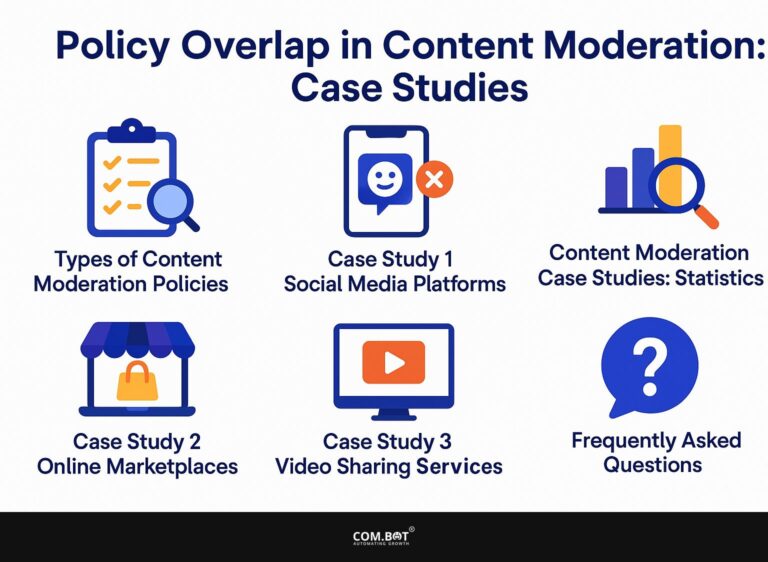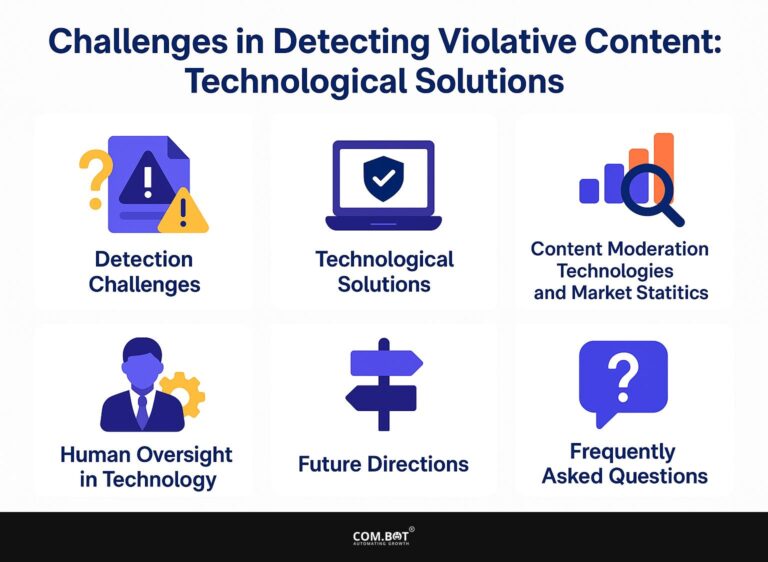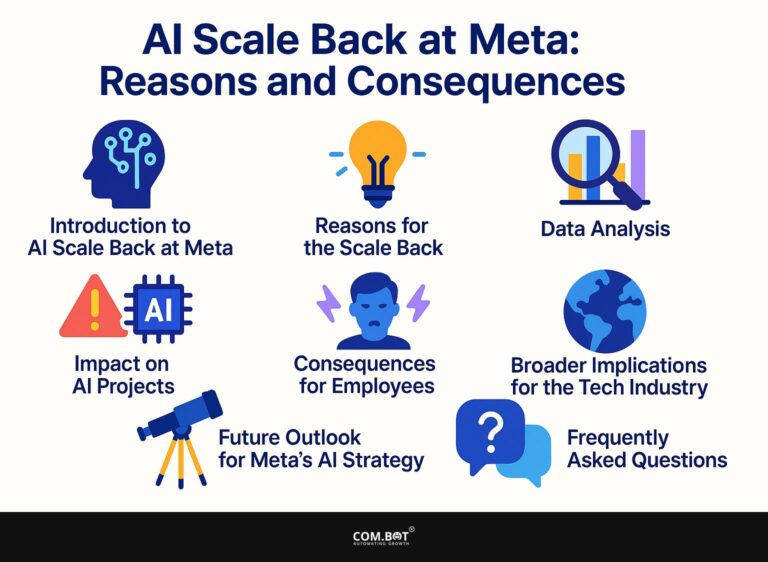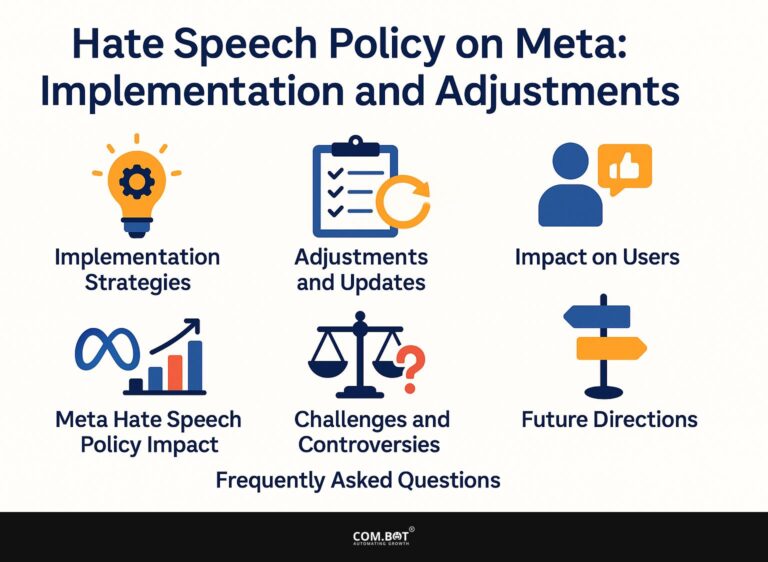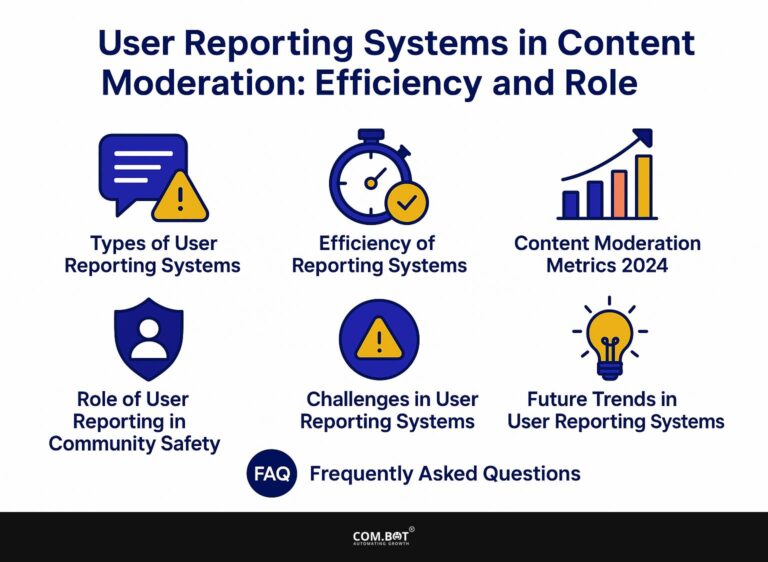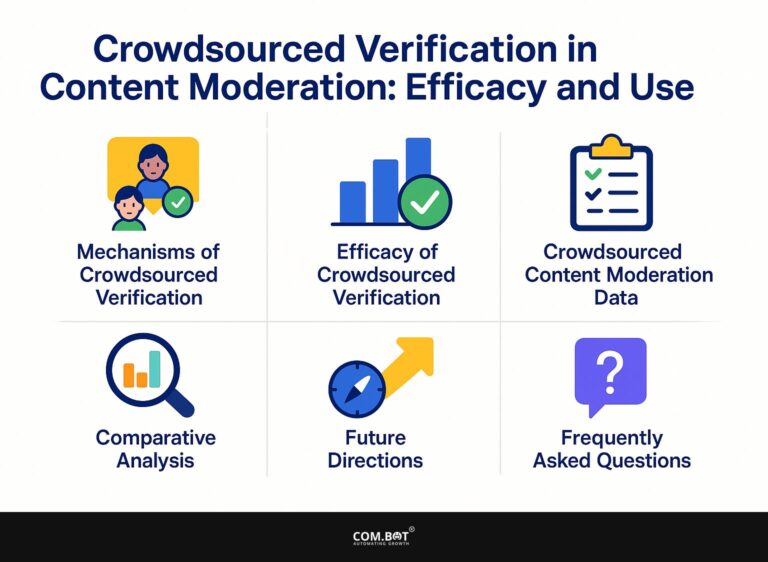Meta AI: Role, Tools, and Limitations in Content Moderation
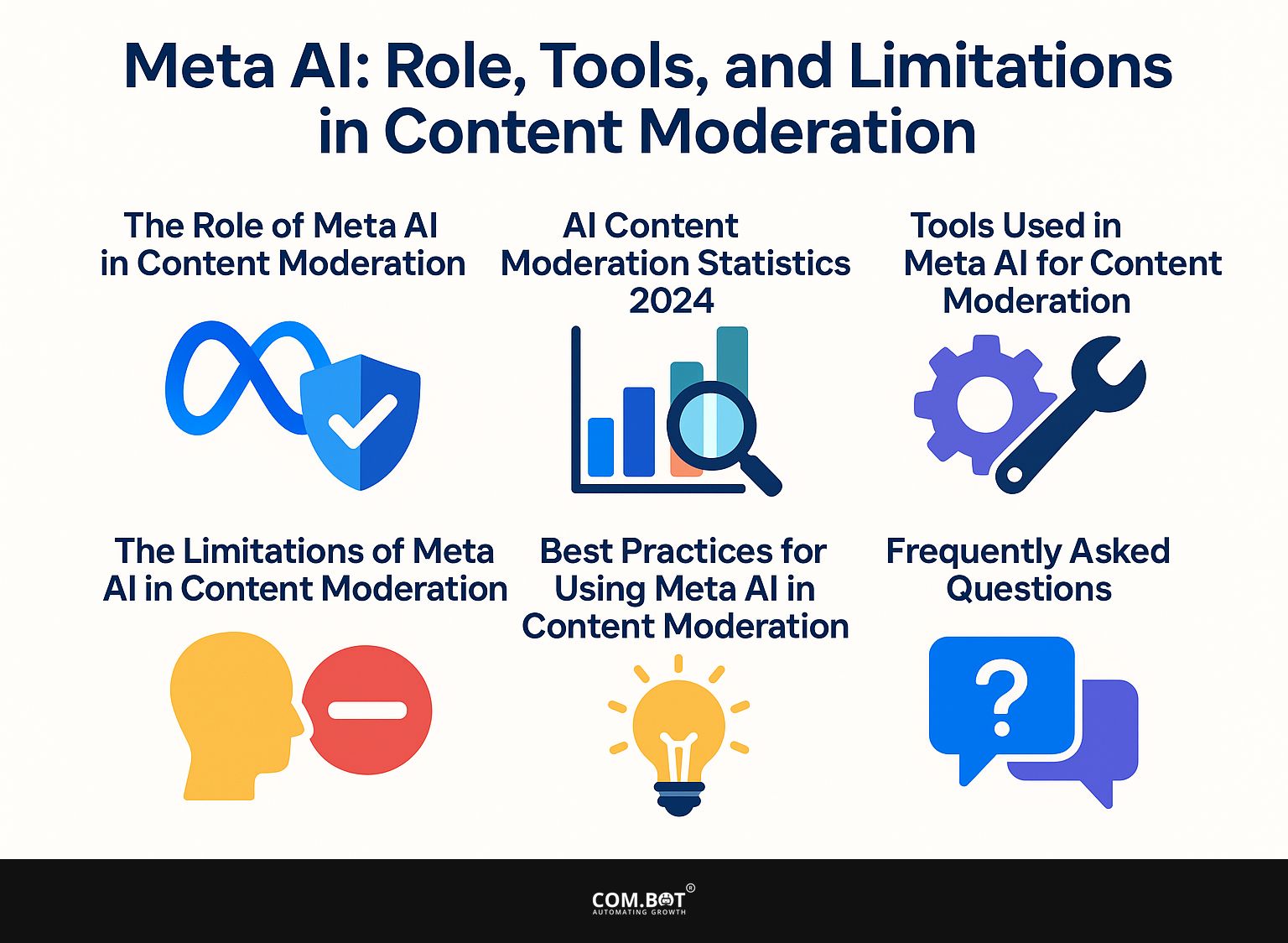
Handling online content is essential today. Meta plays a pivotal role in content moderation We use modern tools to make sure interactions are safe and respectful on different platforms.
This article looks at how Meta helps with controlling content, the strong tools it uses, and the limitations and challenges it faces. We will talk about how to use Meta in a good and honest way, sharing practical tips to help understand its challenges. online content management.
Key Takeaways:
- Meta AI is important in content moderation by helping human moderators find and remove content that is inappropriate or harmful.
- Meta AI uses a variety of tools, such as natural language processing and image recognition, to analyze and flag content for potential violations.
- Despite its capabilities, Meta AI has limitations and potential risks in content moderation. It is important to use it ethically and supplement it with human oversight and intervention.
- 1 The Role of Meta AI in Content Moderation
- 2 AI Content Moderation Statistics 2024
- 3 AI Content Moderation Statistics 2024
- 3.1 Market Growth and Moderation Trends: Market Valuation
- 3.2 Market Growth and Moderation Trends: Content Reporting and Actions
- 3.3 Market Growth and Moderation Trends: Content Moderation Segments
- 3.4 Market Growth and Moderation Trends: CAGR by Segment
- 3.5 Market Growth and Moderation Trends: Regional Market Share
- 3.6 How Meta AI Helps in Managing Content
- 4 Tools Used in Meta AI for Content Moderation
- 5 The Limitations of Meta AI in Content Moderation
- 6 Best Practices for Using Meta AI in Content Moderation
- 7 Frequently Asked Questions
- 7.1 1. What is Meta AI and what is its role in content moderation?
- 7.2 2. What tools does Meta AI use for content moderation?
- 7.3 3. How does Meta AI handle cultural and language differences in content moderation?
- 7.4 4. What are the limitations of Meta AI in content moderation?
- 7.5 5. Can Meta AI completely replace human moderators in content moderation?
- 7.6 6. How can platforms make sure Meta AI is used ethically in content moderation?
What is Meta AI?
Meta AI is a new system created by Meta, the company that owns Facebook and Instagram, to improve how users interact with digital platforms. Meta AI uses advanced AI technology to help with live exchanges, improve how content is shared, and follow community rules while dealing with user privacy worries.
Meta AI is committed to being clear and responsible, aiming to balance user control and free expression in online groups. This AI system works on different online platforms, analyzing a lot of user data to customize content suggestions and increase engagement, making sure users get experiences that match their interests.
The use of user data brings up ethical concerns about privacy and the chance of influencing public conversation, especially with algorithms organizing and spreading information. Related insight: Com.bot’s 24/7 AI Support Bot addresses similar concerns with AI-driven interactions and privacy. Meta AI plans to reduce harmful content by using strict rules and encourages a range of perspectives.
The system’s implications extend beyond individual platforms, sparking critical discussions about the responsibilities of tech companies in shaping online interactions and the need for accountability in AI-driven communications.
The Role of Meta AI in Content Moderation
Meta AI is important for moderating content on its platforms. It uses AI to find and manage harmful content, false information, and behavior that breaks the rules. This approach aligns with the principles outlined in our analysis of Com.bot Enterprise Omnichannel Automation, which emphasizes streamlined processes across multiple channels.
Meta uses automated systems and human workers to make sure rules are followed, balancing free speech with legal rules and community standards.
This combined approach makes users more satisfied and active, creating safer online environments.
AI Content Moderation Statistics 2024
AI Content Moderation Statistics 2024
Market Growth and Moderation Trends: Market Valuation
Market Growth and Moderation Trends: Content Reporting and Actions
Market Growth and Moderation Trends: Content Moderation Segments
Market Growth and Moderation Trends: CAGR by Segment
The AI Content Moderation Statistics 2024 report illustrates a rapidly growing market for AI-driven content moderation solutions, with significant implications across various industries and regions. This data provides details about market value, content reporting patterns, division, and trends in different areas.
Market Growth and Moderation Trends show that the content moderation market is set for significant growth. The market size is expected to increase from $10.01 billion in 2023 to $30.75 billion by 2032 “, showing a strong annual growth rate (CAGR) of” 13.33%. This growth is driven by the increasing need for platforms to manage user-generated content effectively, ensuring compliance with regulations and protecting users from harmful content.
- Content Reporting and Actions: The report highlights a dramatic 1,830% increase in reported accounts and tweets, alongside a 300% rise in account suspensions. These numbers highlight the growing difficulty of managing large amounts of content, requiring advanced AI tools to keep the platform safe and trustworthy.
- Content Moderation Segments: In 2023, the solution segment holds a 61% revenue share, while media and entertainment accounts for 28%. Additionally, 71% of revenue is due to cloud deployment, showing a clear preference for solutions that can grow and adjust easily.
- CAGR by Segment: Small and medium-sized enterprises (SMEs) are projected to experience a CAGR of 15.14% from 2024 to 2032, while the video segment is expected to grow at 16.18%. These numbers indicate an increasing use of AI moderation while video content expands and small and medium enterprises look for affordable moderation options.
- Regional Market Share: North America dominates with a 40% market share in 2023, indicating a mature market with established moderation practices. In contrast, the Asia Pacific region is expected to grow at a compound annual growth rate (CAGR) of 15.04% during 2024-2032, driven by expanding internet penetration and rising content creation.
The AI Content Moderation Statistics 2024 The report points out a fast-changing market with many chances for expansion, and also the role of AI vs Human Content Moderation. Companies offering advanced moderation solutions, particularly in video and SME segments, are well-positioned to capitalize on this expansion. As the market changes, local differences and specific requirements for each segment will lead to more innovation in AI content moderation technologies.
How Meta AI Helps in Managing Content
Meta AI helps moderate content by using advanced algorithms and systems to identify harmful misinformation, allowing for quick removal of content and supporting human moderators. Collaborating enhances the moderation process, ensuring that content rules are applied and community guidelines are upheld, while focusing on making clear and responsible choices.
Through features like real-time detection mechanisms, Meta AI quickly flags inappropriate content before it reaches a wider audience, thus preserving the integrity of user interactions.
Human involvement is important in this system; automation deals with most routine moderation tasks, but experienced moderators check flagged content to make decisions that algorithms might miss.
Balancing technology with human judgment improves user experience by creating a safer online space. It also brings up ethical issues about bias and mistakes, leading to ongoing talks about using AI responsibly on social media platforms.
Tools Used in Meta AI for Content Moderation
Meta uses different tools in its AI moderation system to deal with the problem of content moderation on its platforms. These tools use advanced AI technology to look at user data, find patterns of harmful content, and help enforce community rules.
By combining algorithmic moderation with the guidance of the Oversight Board, Meta works to make sure its moderation methods are both effective and fit with user interactions and cultural settings.
The Limitations of Meta AI in Content Moderation
Meta AI, despite its progress, still has some challenges in content moderation. It struggles with fully grasping the subtle differences in misinformation across different cultures.
AI can sometimes show bias, which might lead to wrongly identifying harmful content or unnecessary censorship. This brings up worries about the ethics of using computer-controlled moderation.
Therefore, while AI moderation can be more efficient, it cannot replace the important work of human moderators who can better understand public conversations.
Challenges and Potential Risks
The issues and risks associated with Meta AI in content moderation arise from its use of computer-driven systems. These systems can unintentionally cause problems like user privacy issues and the spread of unchecked false information.
As social media changes, Meta needs to handle these risks responsibly and keep users happy on its platforms. This requires a delicate balance where transparency becomes paramount. Users expect to understand how their data is used, especially when algorithms dictate what content they see.
The spread of false information is a big problem that can weaken community trust. It’s important for the company to create strong ways to interact that encourage positive conversations.
Maintaining community standards is another hurdle; the diverse backgrounds and values of users present the risk of conflicting interpretations of acceptable content.
By addressing these concerns, the commitment to social responsibility can be reinforced, building a safer and more informed online environment.
Best Practices for Using Meta AI in Content Moderation
Applying effective methods for using Meta AI in content moderation is key to encouraging a responsible and ethical approach that respects user independence and supports community involvement.
These methods should involve transparency in moderation actions, collaborating with human moderators, and adhering to community rules, ensuring that both free speech and user satisfaction are prioritized.
Guidelines for Effective and Ethical Use
To make sure Meta AI is used correctly and ethically in content moderation, organizations should set clear guidelines. These guidelines should focus on improving user experience and ensuring accountability while dealing with the challenges of using automated systems. These guidelines should emphasize the need for transparency, user feedback, and ongoing evaluation of moderation practices to uphold community standards and mitigate potential biases inherent in AI technologies.
By doing this, organizations can create an environment where people work together and trust the AI systems that control content filtering.
It’s important to set up clear communication lines where community members can express their concerns and share their thoughts about moderation choices.
By regularly checking how the AI is doing through data analysis, organizations can improve their moderation plans and make sure they follow changing community guidelines and ethical rules.
Helping people understand what AI can and cannot do can make users feel more connected and happy with the platform.
Frequently Asked Questions
1. What is Meta AI and what is its role in content moderation?
Meta AI, or Meta Artificial Intelligence, is a form of AI that uses algorithms to analyze and moderate content on digital platforms. Its role in content moderation is to identify and remove inappropriate or harmful content, such as hate speech or graphic images, from online platforms.
2. What tools does Meta AI use for content moderation?
Meta AI uses a variety of tools for content moderation, such as natural language processing, computer vision, and machine learning algorithms. These tools help the AI analyze text, images, and videos to determine if they violate platform policies.
3. How does Meta AI handle cultural and language differences in content moderation?
Meta AI is trained on a large dataset that includes various languages and cultural contexts, allowing it to recognize and moderate content in different languages. However, it can still have trouble with subtle meanings and language that depends on specific situations, which might limit how well it works.
4. What are the limitations of Meta AI in content moderation?
Meta AI might struggle to correctly detect and eliminate specific content, like language that depends on context or satire. It may also struggle with detecting subtle forms of hate speech or misinformation. It might struggle to handle changing and emerging types of harmful content.
5. Can Meta AI completely replace human moderators in content moderation?
No, Meta AI cannot completely replace human moderators in content moderation. Although it can quickly review a lot of content, human moderators are still necessary to make final decisions and manage more difficult and sensitive issues.
6. How can platforms make sure Meta AI is used ethically in content moderation?
Platforms must set clear guidelines and standards for the use of Meta AI in content moderation and regularly monitor and evaluate its performance. They should include different viewpoints and keep enhancing the AI to reduce possible biases and guarantee fair content moderation.
